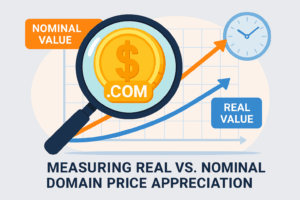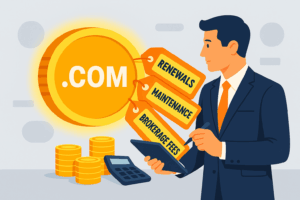On the Record: Pulley.com

You may not have heard of a cap table before, but for startups and established companies alike, equity management through a cap table is vital.
Many companies used to use a simple spreadsheet to keep track of company ownership, but the smartest businesses are now turning to Pulley.
Pulley manages all equity transactions on a platform that scales with a company. With more than 50% of Y Combinator startups using Pulley, it seems like the de facto choice for cap table management.
Pulley operates its platform from Pulley.com, a domain it secured before launching. Here, I chat with Pulley’s founder, Yin Wu, about her experience as a three-peat founder, and of course, we talk about the Pulley.com domain name.
What is your entrepreneurial background, and what does Pulley offer?
To give you context of what Pulley does, we help founders manage their cap table and equity plans.
My background is I’ve been a repeat founder. I actually dropped out of college to start my first company. We got into Y Combinator at the time, and I remember very, very naively thinking. “It can’t be that hard to start a company, everyone else is doing it.” As you can imagine, it is really hard.
What are cap tables?
A cap table effectively tracks ownership within your company. A lot of startups often raise funding from angel investors.
If you own a portion of the company, all of that is recorded on your cap table. So, Bob, the founder, can own a thousand shares. Jane, their first employee, owns a hundred thousand shares. You need to keep track of the ownership change within the company, especially as the company continues to grow.
A lot of companies use a spreadsheet to track all of this, and it becomes difficult over time as people are joining the company and as you get new investors, to manage the entire history of your company’s ownership.
The reason we think the cap table and especially equity is so important is for a lot of folks, equity is this unit that can grow in value if your company becomes successful.
I would go as far as to say it is the only asset your company has that can be 1,000X in value if you become like the next Google or Stripe. I think equity is a strong motivation for so many employees when deciding where to join.
At Pulley, we create far better tools for companies, investors, and employees to better understand their equity and make better decisions around the equity.
What should founders know about cap tables, and what should employees know?
When it comes to founders, do the research beforehand. When you’re selling equity within your company, it’s effectively a one-way street.
I need to discuss the domain I own!
There are some founders that we even talk to today that sometimes make the mistake of selling too much of their company early on in order to get funding to grow. If you’ve sold 90% of your company, even if your company does well, it’s unclear that you can stand to benefit from this in the long term.
Employees make pretty big financial decisions when it comes to their equity. Most employees within tech startups receive what is called an option. So, an option gives you the right to pay to receive shares at a very low price, but you still need to buy the shares from the company, and the reason that’s all structured that way is for tax advantages.
But when we talk to a lot of employees, they are making big financial decisions, and it’s not clear what the tax implications of some of those decisions could be. That’s where Pulley comes in. Pulley can help them make good decisions around the equity from a tax and future planning perspective as well.
Pulley looks to be a complex platform. Were there any challenges you encountered in developing it, and how did you smooth out those road bumps?
With a cap table, it’s easy to build this for early-stage companies, but for so many of these things, it becomes more complicated, especially when the companies grow.
We have late-stage companies on the platform that have different vesting schedules, and they have complex stock splits. You need a model, all of that out on your cap table.
I give so much credit to the engineering and product team at Pulley. To think about building the platform, we talked to our users on a daily basis. We want to understand what they need and how we can architect the system as a whole so that we can scale with so many of the companies on our platform as they continue to grow.
Where does the brand name Pulley come from?
The reason we named the company Pulley is that sometimes when you’re a founder, it can feel like you’re just pushing this boulder uphill. A pulley is a simple machine that makes it a bit easier for someone to lighten the load of doing the seemingly impossible task of being a founder and scaling something from zero to one.
So, we think about the customer on Pulley and what we can do to lighten their load. That’s where a pulley comes in.
Did you have any other brand names in mind, or was Pulley always your desired brand name?
We had some really bad names in mind.
We were thinking about what we can derive from the ‘cap table.’ So, like Capasaurus. I have to say Pulley is much better than Capasaurus! Capricorn was another one that we were thinking of, but that domain was extremely expensive for us to acquire, so we decided not to go down that route.
Pulley was not the first name that we came up with but what we were hoping to do was to get a name that we felt was very brandable and also very much fitted the story of the company, which is how do we make it easier for someone that’s starting something new, becoming a business owner. How do we make their lives a lot easier?
When you’re choosing a name for the company, there’s also the logistics side of it, where you’re looking into whether this name is available when it comes to the domain? Can you get the Twitter handle?
So, the availability of the domain and Twitter handle was important?
We got the @Pulley Twitter handle, so it felt like it was a good sign. I thought if we could get the domain and the Twitter handle, this would be a great way for us to go.
I think if you’re able to get a good domain and a good brand name, the benefit that you get there is instant credibility.
For us to be able to have Pulley.com versus Pulley.io or GetPulley.com, I think it was a different mindset shift where it’s like, “oh wow, they have Pulley(.com)” This you immediately think of the company as more reputable as well.
Did you start out on Pulley.com?
We started on Pulley.com. When we first started the company, we had a name for the company before we had a name for the product.
One other thing I’d add is that we were thinking about something that doesn’t just limit what Pulley can build in the long term. We didn’t want to be just CapTables.com because then the only product that you build is cap tables.
When you think about branding, you think about building a generational company, and you think about the suite of products that you can provide in the future. I tend to be biased toward names and brands that are more generic, and you can tell a story around future product lines as well. Stripe is a great example of this.
What this something you considered at your previous companies, too?
We’ve done the gamut. One company was a same-day laundry delivery. You could push a button, and we’d pick up, wash, and fold your clothes. That company was called Prim.
For another company, which we ended up selling to Microsoft, we were building a smart lock screen for Android phones. We called that Echo. So, it echoes the messages that you get on your phone. I think that short, brandable names are what stick in most people’s minds.
A test of that is if you go to a bar and tell someone what you’re working on, can they understand it? It also is a tell for whether someone can spell that domain as well.
Did you secure any other domains to protect the Pulley brand?
Yeah. We snapped up Pulley.io and tried to buy other domains as a way to also protect the brand and protect the trademark that we have.
How did you acquire Pulley.com?
We worked with a domain broker, and I’d recommend most companies to do the same as well because you’re so busy a lot of the time.
I think working with a professional that has done this type of process can help accelerate the process. They know how to reach out to the person that holds the domain and how to handle the negotiation and the back-and-forth conversation.
I would say we got very fortunate with the price of Pulley.com, and it’s likely worth far more than what we actually paid.
In terms of getting new clients, is the website your number one way of attracting new clients?
Most companies hear about Pulley through word of mouth and then go to our landing page to find out more about the product. I think the website for us is very much core to it.
Is it important to have an outstanding domain name to attract them to your service?
Yeah. The other thing I’d also add is if you think about it from an SEO perspective, you want a name that it’s possible for you to get onto the first page of the search results much faster than other names.
For us to accelerate the branding of this, because there wasn’t a strong competitor, I think was, was one very strong reason for why we wanted to go with Pulley.
You see a lot of companies that have very generic names because it’s easier for them to also brand the name and own it as theirs.
I think the advice I would give to companies when thinking of the brand is A, can you acquire the domain rights to it? B, can this be something generic that scales where the company is the number of products that you build to scale? And C, can you own that name when it comes to search in a short amount of time because of the number of competitors in the space or less.
Where does Pulley go from here?
We’re launching additional products for Web3 and crypto companies to help new verticals of companies also manage their cap table and their equity. That’s something that we’re excited about.
We’re also increasingly starting to help companies manage equity for international employees because I think especially with COVID, what you’re starting to see is that it doesn’t matter where you’re based in the world; folks are looking for better ways to be able to compensate and benefit, the people that they work with.
__
Thanks to Yin for participating in On the Record! If you want to find out more about Pulley, you can visit Pulley.com or follow the company @Pulley on Twitter.



